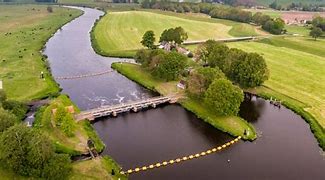(Nederlands artikel is onderaan de pagina)
A new project (SpongeWorks) worth 15 million euros, funded by the European Union’s Horizon Europe programme, will launch in September 2024. The goal of the project is to keep safeguarding the health of the European landscapes, with a focus on water retention and storage, thereby preventing floods and drought. Researchers at the faculties of Engineering Technology (ET) and Behavioural, Management and Social Sciences (BMS) of the University of Twente (UT) will conduct research into stakeholder collaboration, amongst other things.
Europe is heating up twice as fast as the rest of the world. Extreme weather conditions are becoming increasingly acute. Since 1980, floods in Europe have caused over 4,300 casualties and over 170 billion euros in economic damage. An important factor determining whether these costs will be limited or aggravated in the future is the health of European landscapes and their capacity to retain and store water. Although natural solutions are increasingly accepted as a sustainable approach to improving the resilience and water retention capacity of landscapes, there are still major obstacles on the road to largescale application.
The UT researchers, led by Dr. Ir. Joanne Vinke-de Kruijf, focus on a number of concrete questions. Which tools and methods contribute to finding and implementing solutions that are effective, integral and fair? How can parties work together in creating sponge strategies at landscape scale? The DesignLab at UT coordinates the collaboration between the project partners and other stakeholders in the Dutch-German Vecht river basin.
SpongeWorks: Co-creating and Upscaling Sponge Landscapes by Working with Natural Water Retention and Sustainable Management
For the Dutch contribution, Vechtstromen Regional Water Authority, Deltares and UT are working together with international project partners on the question of how you can bring about major changes to improve the resilience of ground-water, soil, and surface water systems at the landscape scale in the interests of both humans and nature. The project implements a variety of ‘sponge’ measures, ranging from different types of agricultural and general management practices and the creation of hedges, buffer strips and infiltration ponds, to the restoration of rivers and peatlands and the rewetting of forests, floodplains and grasslands. These measures will be evaluated for their ability to improve soil health and natural water retention, prevent erosion and replenish aquifers. UT researches the extent to which current governance structures allow for the implementation of these measures, which new collaborations and actions may be required, and which tools and methods can best be used for this. In the research project, UT focuses on the German-Dutch Vecht river basin and on river basins in France and Greece.
SpongeWorks, which consists of a consortium of 28 partners, is coordinated by Leibniz University Hannover (Germany) and Deltares Nederland. Its activities include the implementation of scientific knowledge in three largescale demonstration projects. The river basins are located in France (Lèze), Greece (Pinios) and on both sides of the border between the Netherlands and Germany (Vecht).
dr.ir. J. Vinke - de Kruijf (Joanne)Associate Professor

Een nieuw project (Spongeworks) van 15 miljoen euro, gefinancierd door het Horizon Europe Programma van de Europese Unie gaat in september 2024 van start. Het doel van het project is de gezondheid van de Europese landschappen te blijven waarborgen en dan voornamelijk om water vast te houden en te bergen. Overstromingen en droogte worden zodoende voorkomen. Onderzoekers van de UT uit de faculteiten ET en BMS doen o.a. onderzoek naar de samenwerking tussen partijen.
Europa warmt twee keer zo snel op als de rest van de wereld. Extreme weersomstandigheden worden steeds acuter. Sinds 1980 hebben overstromingen in Europa geleid tot meer dan 4300 doden en meer dan 170 miljard euro economische schade. Een belangrijke factor die bepaalt of deze kosten in de toekomst worden beperkt of verergerd, is de gezondheid van Europese landschappen en hun vermogen om water vast te houden en te bergen. Hoewel natuurlijke oplossingen steeds meer geaccepteerd worden als een duurzame aanpak om de veerkracht en de waterretentiecapaciteit van landschappen te verbeteren, zijn er nog steeds grote hindernissen die een grootschalige toepassing in de weg staan.
De onderzoekers van de UT onder leiding van dr.ir. Joanne Vinke-de Kruijf richten zich op een aantal concrete vragen. Welke hulpmiddelen en methodieken dragen bij aan het vinden en implementeren van oplossingen die effectief, integraal en rechtvaardig zijn? Hoe kunnen partijen samen toewerken naar een nieuw soort landschappen? Het Designlab van de UT coördineert de samenwerking tussen de partijen in het Nederlands-Duitse Vecht stroomgebied.
Spongeworks: Co-creating and upscaling Sponge Landscapes by Working with Natural Water Retention and Sustainable Management
Voor de Nederlandse bijdrage werken Waterschap Vechtstromen, Deltares en de UT in het project samen met internationale partners aan de vraag hoe je grootschalige veranderingen teweeg brengt om de veerkracht van grondwater-, bodem- en oppervlaktewatersystemen op landschapsschaal te verbeteren voor mens en natuur.
Het project implementeert een verscheidenheid aan 'spons'-maatregelen, variërend van verschillende soorten landbouw- en bredere beheerspraktijken, het creëren van heggen, bufferstroken en infiltratievijvers, tot het herstellen van rivieren en veengebieden en het opnieuw vernatten van bossen, uiterwaarden en graslanden. Deze maatregelen zullen worden geëvalueerd op hun vermogen om de gezondheid van de bodem en de natuurlijke waterretentie te verbeteren, erosie te voorkomen en watervoerende lagen aan te vullen.
De UT doet onderzoek naar de mate waarin huidige governance structuren de implementatie van deze maatregelen toestaan, welke nieuwe samenwerkingen en structuren wellicht nodig zijn en welke hulpmiddelen en methodieken hiervoor het beste ingezet kunnen worden. In het onderzoek richt de UT zich op het Duits-Nederlandse Vecht stroomgebied en op een stroomgebied in Frankrijk en Griekenland.
SpongeWorks, dat bestaat uit een consortium van 28 partners wordt gecoördineerd door de Leibniz Universiteit Hannover (Duitsland), en Deltares Nederland en implementeert o.a. wetenschappelijke kennis in drie grootschalige demonstratieprojecten. Stroomgebieden in Frankrijk (Lèze), Griekenland (Pinios) en een grensoverschrijdend stroomgebied in Nederland en Duitsland (Vecht).

dr.ir. J. Vinke - de Kruijf (Joanne)
Universitair hoofddocent





